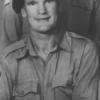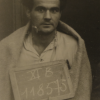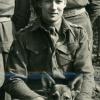I had been in the Black Watch on joining up. Joined 9th Para. Bn.
How I got into the 9th Parachute Battalion, a friend of mine, his brother was Colonel…, Lieutenant Colonel Hill, he was the 9th Parachute Battalion commander.His brother, I knew in the village, and just by chance told him I was in the Parachute battalion. So Derek Hill said, ‘Why don’t you join the 9thPara. They’re at Bulford.’ My home is at Ludgershall, and Bulford and Ludgershall are only a bus journey, seven or eight miles, something like that, so I said, ‘Yes please.’ So somehow, he had a word, and he got me into, through his brother, I got into the 9th Para. I could have gone to any of the parachute battalions. I went into the Parachute Regiment as a whole and then you get placed you see. And so I ended up in Bulford.
At Bulford I did all my parachute training with the 9th, quite a long time, I can’t really remember… . I expect I was a good year there and did absolutely all my parachute training with the 9th. I already became a parachutist you see. You get to become a parachutist and then get placed in a battalion. So that was handy for me because I could go home every night. Did his training at Hardwick Hall and Ringway.
The following story was during a training jump on Salisbury Plain, from an Albemarle: Because I lived seven miles away, I used to take the lads home. We had an exciting time once. I was acting corporal on a stick and we were jumping on Salisbury Plain. We would come in over Andover and all the way over my father’s garage and over my house, all the way up and along that valley and then we’d start dropping… .While we were there I said, ‘That’s my home down there, we could drop in for a cup of tea !’ All the lads said, ‘Right. You’re on !’ I was embarrassed. They said, ‘Comeon. You said !’ We had the doors open. We were in an Albemarle… .I could see where we were, over Collingbourne Ducis, which was only three quarters of a mileup to where my mother and father lived. It’s a lovely long stretch of green. So we jumped, and out we went, but the bomb doors hadn’t been opened yet, so No 5jumps, and he pulls a string…, so if you’re No 6 whatever you do have a drink of coffee you go ‘container, container’ so everything you do is around that two word delay. So that when you jump, No 5 comes out, and No 6 before he comes out says, ‘Container, container.’ That’s so he won’t hit [the bloke in front]. I had presumed he would say, didn’t give it a thought, but No 5 had jumped and pulled the string, so the containers come out, but the bomb doors hadn’t been opened. So we got further on,and they opened the bomb doors, but we were down, rolling our parachutes up. Only about two minutes later ‘cos we were on the run-in. Soon after that he would have put the red light on for ready…, and then the green light on, but we’d already gone! Rang through that we’d had an accident, I went out and the rest followed me automatically. So all these paratroops arrived at home. Mum made them tea and cake. I got a truck organised from Bulford. The truck came across and picked us up.
Unfortunately, meanwhile, they had opened the bomb doors and the container fell over the Post Office at Collingbourne Ducis, and went through the thatched roof and stuck up through the thatched roof. One of the senior generals, a staff officer, was going from one town to Tidworth or Bulford saw Airborne lorries there, because the police had got in touch. So he stopped to find out who it belonged to and it belonged to the 9th Parachute Battalion. So he tracked it down and Lieutenant Colonel Hill had me in and I got the sack from corporal to private! You were always in trouble when he said, ‘You’ve let the side down, Stoodley.’ I don’t think he ever believed the story but we all stuck to the story that we actually dropped in for tea!It was a million to one chance but we forgot what we were doing.
Transferring to the 22nd IPC:
There was like a notice board, they called it ‘Standing Orders’ or ‘Daily Orders’,whatever it is, you read the every night. That’s what you’re supposed to do.He saw a notice on the Daily Orders board about a unit performing special duties, and being young and gung-ho, decided to volunteer. Was interviewed by the CO, Major Gordon Lennox-Boyd. We had about six interviews for it. All with Lennox-Boyd because we were only 120 men all together. Only 60 of us went on the invasion. His mother was cousin to the Queen Mother… .Did Lennox Boyd’s men speak different languages? I spoke a little German. One of the reasons he was interested in me is because I was learning German. But he wanted me to speak French and I just couldn’t get hold of it. He still agreed to have me anyway. It was all part of getting a comprehensive team.
Another incident on Salisbury Plain:
My brother, he was 14. We were all let go on leave and I was supposed to be Duty Officer, even a corporal could be a Duty Officer for a small regiment like this, so
you’re in charge and I left the signalman. He got in touch with me at my father’s garage to say that 48 Group, that’s the RAF at Netheravon, had telephoned through
to say the weather was going to be good and there was going to be a big drop up on Salisbury Plain and they gave us the landing zone… . I was at home and I had, it’s called a 15cwt, it’s a truck, Army truck, I had taken that home with me. By chance I had the Eureka. I wasn’t without a Eureka, either looking after it or caring for it or cleaning it or repairing it, or changing the batteries in it. I had to go tearing back; Ludgershall was only shall we say, where the dropping zone is, maybe ten miles,
maybe a little further, so Jim and I went tearing back to Bulford and then out to Salisbury Plain, the dropping area just across the road, Tidsbury Tinsbury [Tilshead
?] and then you came out to the big landing area. We knew which field we were going to be in, and we were late, and we could see the planes in the air. There was
about probably about 12, 15 planes in the air; it would have been a battalion coming in. It could have been up to at least 20 planes. Jim got the Eureka going, standing in the back of the truck ! They were coming to us and as I drove across the field they were veering, 25 miles away or whatever distance we could see. And we just got more or less into the field where we were supposed to be and we just made it. And my brother was 14 years old! I should have been at Bulford you see, but nothing ever happens at week-ends, you leave there and I’m available. But we got them down! Jim was holding on to the [aerial], standing on the Eureka so that it wouldn’t bounce and they veered around to follow us.
D-Day. Bob was jumping No 5 on one of the two aircraft heading for DZ K at
Touffreville:
As we got over the French coast we were told, someone was looking out, they could see, I was number 5. Just under the air gunner were some lights and I could see the ack-ack starting up. That was pretty horrific, well it was for me but it didn’t seem to worry the pilot too much. And then it got worse. You just hear the noise… .
Explosions. Against the noise of the aircraft, it’s loud enough to hear, it’s a crack all the time. They were clearly well awake, but we weren’t hurt and the pilot must have thought they were getting a bit too close and he started weaving and weaving. I think for searchlights as well, but I could see lights and explosions outside, now and again. What I could see through, over the fellow’s shoulder in front of me, I could just see flashing and lights, but I didn’t see any boats or ships at all. It was only when we got over the coast, the last few, you’re talking minutes now before we hit the coast and by the time we got over. We hit the coast further up. I thought if we hit the coast square, we’d only be a minute away, but we went up there, so we were over land, and coming down towards the ‘K’ DZ. Then the red light came on, so we all got ready to go. One or two people were sick. I wasn’t feeling too good, but I wasn’t sick. We got all ready to go and then out we went. When the green light came on, the plane got pretty level and I no sooner got out than I swung around and I could see Escoville church and Touffreville church, perfectly, that I’d been trained for. I knew exactly where I was. The moment I got out of the plane, I knew my chute had deployed, I looked at the churches, I knew exactly where I was. I pulled my kitbag, let that down; dropped a little bit too fast for my liking. We dropped so low. We dropped just under 600 feet, mainly because if there were any Germans there, we didn’t want to be seen.Bob Midwood had agreed with the pilot that we’d be as low as possible. There were no obstructions there, everything was in the vales, very low down, the churches were in the vales, so we were flying over high ground, the dropping zone was above the
villages… , just rolling countryside. I looked for a good place, right in the middle of the cornfield; the corn was reasonably high. I hit the ground. Looked round for Paddy and he didn’t arrive, so I set up the aerial myself. Then Sergeant Boardman came, called out ‘Bob Stoodley’. He set up the Eureka. And then suddenly I got a beep; I could hear it hitting. I got a beep back. I knew I’d got the plane. And then it came, although at one moment I felt they’d abandoned us, and Sergeant Boardman and Ken Naughton, Ray Hackman (check spelling), they were out, they call it a circle on the outside to make sure the Eureka’s not going to be captured. You form a defensive circle around it. Sergeant Boardman was in charge of that. Anyway, it got worse, the signal got louder and louder, and suddenly I could see the planes. Out of the blue, out they came. It was a joy to see it. And they were everywhere. One moment you’re just four, and the next moment you’ve got a mass of soldiers dropping around you. I have been on every dropping field in England as a Pathfinder and I knew how to bring gliders in, but it wasn’t ever the same. In the darkness, all this descending on you, and they didn’t even know where they were landing, didn’t even know where they were going. They all started landing around him. They all formed up and then suddenly they left us, and we were on our own. The next day we would use the DZ again, but it was never used again; the Germans overran it… .They just disappeared. We then just started to get our kit together… . No, we searched the DZ for injured people and strays. As soon as the 8th Battalion moved off, the Germans got braver. They knew we were there. I think they knew we were there because we did not have the sense to keep quiet. I didn’t do an awful lot, I stuck with my radar, and I only just had a Sten gun, but Jack Leverett had a Bren gun and we were short of ammunition, well at that time we weren’t, but he was sort of key man and Sergeant Boardman went out with Hackman, and they got into some trouble. They came back and said, ‘There’s Germans all around us.’ Daylight was coming now and we realised that we weren’t going to go far, but Boardman had ideas that we could hold on, because the Army would be coming up from the beaches.
We kept getting interference from the Germans all the time, but we could hold them at bay. And then it got worse and they were all around us. And then they brought
in…, a MkIV. They tied me on the back of that when I got blown up; they came and got me, the Germans, came and got me, I was in a trench, and they put me on that, and I was being fired at by other soldiers. They were either some of our lads…, or remnants of the 8th Para or people coming up from the main dropping zone. And so they turned the tank around, went out sideways and the turret protected me. They kept firing at the tank. It seemed like the whole world was firing at me.
Had a bullet in the left calf, and a bullet in the left arm, just above the elbow. When on the tank and it was hit by bullets, that cause bits of metal to splash off. One
little piece of this shrapnel had hit him in the face. The officer was sitting in the roof of the tank, talking on it, and he helped me off with the men.., off the camouflage net. They had a strap over the camouflage net, not stop me falling off, not to tie me on, I wasn’t going anywhere ! I was handed over to a front line station, I had a bullet in there, one there and shrapnel in my face and that finger got nicked, nothing serious. I went to the dressing station. I was more stupid, I was knocked out you see, but I can remember quite well, coming to. They had me on a camouflage net and then they dressed me and then after that the SS Feld Police, they have a big chain around their [neck]. How they can wear that I don’t know. It gets in the way ! By God they were nasty pieces of work. So I had a hard time there. Anyway, eventually they took me to Rouen Hospital.
Footnote;
Bob Stoodley on his interrogation: My brain, after being blown up, an being in strange circumstances; I’d been blown up. They kept on saying ‘We give you one more chance’ They wanted to know how many units, how many this and how many that, and I must have been getting weary then. They hit you, twist your arms, it’s not nice, it’s not pleasant. I don’t think I was frightened. I’d been treated quite badly by, threatening and helping you on with a punch here and there, really nasty, and I actually looked at him and thought ‘You wouldn’t do this if my mother was here!’ My mother, she was a tyrant. She really was. If you were a Stoodley, you were the world. Nothing else mattered. And if she had been there, they’d really have been in trouble! What they do outside, they always shoot a gun off, and I’m pretty sure they were not shooting anybody; the oldest trick in the world. To get this clear in my mind, by mid-morning, the Germans were all around you ? I think it was nine o’clock when I was put on the tank. Following the interrogation, LCpl Stoodley was sent to a POW Hospital in Rennes for treatment before being transferred to the main Rennes POW camp. Along with about 600 other POWs, he was loaded onto a train, not knowing where he was going and transported in appalling cramped and unsanitary conditions to Stalag IV-B – the biggest POW camp in Germany – just south of Berlin.
Source:
Jo Thoenes BFBS
Read More




Latest Comments
There are currently no comments for this content.
Add Comment
In order to add comments you must be registered with ParaData.
If you are currently a ParaData member please login.
If you are not currently a ParaData member but wish to get involved please register.